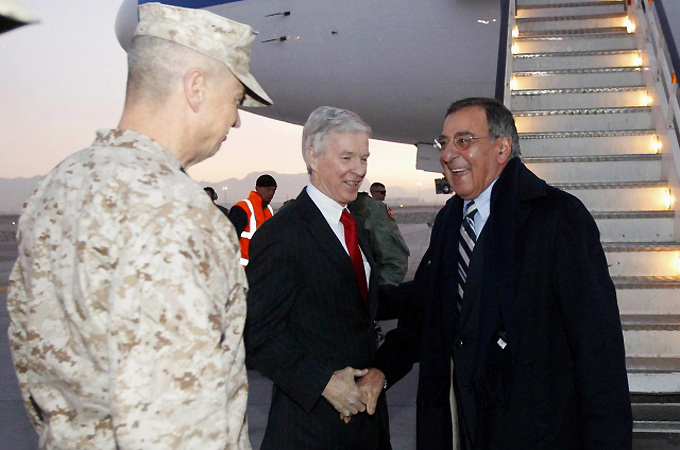US to begin ending Afghan combat role in 2013
Defence secretary says forces will begin to move to training role one year before expected withdrawal from the country.

 |
| Panetta says the end of US combat role is part of a NATO plan to hand over security duties to Afghan forces [Reuters] |
The US has announced plans to end its combat mission in Afghanistan in 2013 and shift to a training role, one year prior to when most US troops are expected to withdraw.
The announcement on Wednesday by Leon Panetta, the US defence secretary, was the first time the US administration had forecast US and allied troops could end their combat operations by the second half of next year.
“Hopefully by the mid-to-latter part of 2013, we’ll be able to make a transition from a combat role to a train, advice and assist role,” Panetta said aboard his plane en route to a meeting of NATO defence ministers in Brussels.
“That’s basically what … we did in Iraq. And it’s what we’re going to try to do in Afghanistan.”
In keeping with the approach used by the administration of President Barack Obama in Iraq, Panetta said the end of a US combat role in Afghanistan is part of a gradual NATO plan adopted in Lisbon in November 2010, which calls for handing over security duties to Afghan forces by the end of 2014.
The US had no plans to move up the 2014 deadline for the withdrawal of American and coalition forces, Panetta said.
Transition phase
Of stepping back from a combat role, Panetta said “everybody assumed that there would come a time, as we move towards the end of 2014, that we would be transitioning that role”.
After a decade of war, the US has vowed to withdraw combat forces battling the Taliban by the end of 2014 while leaving the door open to a follow-on force focused on training, depending on the outcome of negotiations with the Afghan government.
“We all went in here together and we’ll all go out together, but we have to do it on the basis of a strong alliance and a strong commitment that was made in Lisbon,” Panetta said of the US’ NATO allies, including France.
Panetta termed 2013 as a “crucial” year for the final transfer of remaining areas to Afghan security forces and “2014 becomes a year of consolidating the transition”.
It was not immediately clear how the planned shift from combat to a mainly advisory role would affect US troop levels.
Homayoun Hassad, a political analyst based in Kabul, told Al Jazeera that the term “combat” was crucial in Panatta’s remarks.
“What Panetta has mentioned is that he hopes to end or at least reduce combat operations by mid-2013 and that in effect is not new,” he said.
“So I don’t think this is a game changer of any sort. What has been expressed since the conference in Lisbon last year is that there will be a gradual transition specifically of combat operations to Afghan forces.
“The details of this transition were not very clear. These new dates offer some new clarity but nothing in the strategic sense.”
Gradual withdrawal
With nearly 90,000 US troops now in Afghanistan, Panetta said that “no decision has been made with regards to the level of forces we’ll have in 2013”.
By the end of September, the number of US troops is due to drop to 68,000, following the scheduled withdrawal of a “surge force” that deployed in 2010.
He sought to play down the effect of last month’s surprise announcement from President Nicolas Sarkozy to withdraw French combat forces in 2013, a year earlier than planned under the NATO strategy.
“With regards to France, I understand why they made their decision,” Panetta said.
Despite the French withdrawal plans, he said he was “pleased” that France had indicated it would retain a longer-term military presence with troops training and advising Afghan forces.